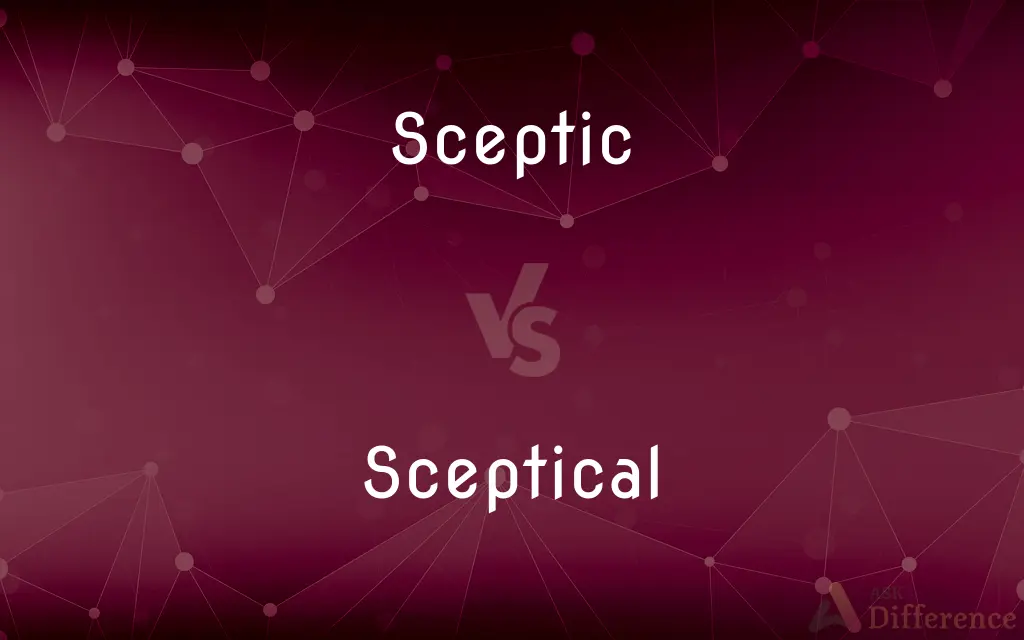Sceptic vs. Sceptical — What's the Difference?
By Fiza Rafique & Urooj Arif — Updated on April 23, 2024
"Sceptic" refers to a person who doubts accepted beliefs, while "sceptical" describes an attitude of skepticism or doubt towards something.

Difference Between Sceptic and Sceptical
Table of Contents
ADVERTISEMENT
Key Differences
"Sceptic" is a noun that describes a person who generally questions or doubts accepted beliefs and claims. On the other hand, "sceptical" is an adjective used to characterize the questioning or doubting attitude itself. Both terms stem from the Greek word "skeptikos," which means to inquire or look around.
"Sceptic" can apply to individuals in various contexts, such as religion, science, or politics, where they exhibit a skeptical approach. Whereas "sceptical" is used to describe the nature of the thoughts or the tone of the discussions that these individuals might engage in. This adjective can modify nouns directly related to the concepts being doubted or questioned.
While a "sceptic" often requires significant evidence before accepting any claims as true, being "sceptical" involves a general disposition or tendency to doubt, which may not always culminate in outright denial but a suspension of belief. This difference highlights the personal nature of being a sceptic versus the broader application of sceptical as a descriptive term.
In professional or academic settings, "sceptic" might identify someone known for their critical perspective, such as a climate sceptic. In contrast, "sceptical" can qualify the approach or methodology used in research, indicating a rigorous, questioning stance toward assumptions.
Organizations or movements might identify collectively as "sceptics," embracing the label to underscore their commitment to questioning commonly held truths. "Sceptical," however, describes the tone or philosophy that permeates the rhetoric of such groups, emphasizing their methodological approach to inquiry.
ADVERTISEMENT
Comparison Chart
Part of Speech
Noun
Adjective
Definition
A person who doubts accepted beliefs
Having or expressing doubt about something
Usage in Sentence
Typically refers to the person
Modifies nouns related to doubted concepts
Associated Fields
Used in contexts like science, religion
Used broadly across various disciplines
Tone or Implication
Often implies a consistent skeptical stance
Indicates a temporary or specific doubt
Compare with Definitions
Sceptic
A member of a philosophical school that doubts the possibility of real knowledge.
She considered herself a sceptic after studying various philosophical theories.
Sceptical
Showing reluctance to accept popular narratives without scrutiny.
He was sceptical of the reports until he saw the data himself.
Sceptic
Someone disinclined to believe without substantial evidence.
The doctor was a sceptic of new treatments that lacked clear research backing.
Sceptical
Inclined to examine claims with caution and critical analysis.
The sceptical audience was hard to convince without substantial evidence.
Sceptic
A figure in debates or discussions known for challenging prevailing sentiments.
His role as a sceptic was invaluable in ensuring thorough analysis in the workshop.
Sceptical
Doubting or questioning the truth or reliability of something.
She remained sceptical about the effectiveness of the new policy.
Sceptic
An individual who questions the validity of particular doctrines or propositions.
The well-known sceptic held a lecture on the pitfalls of modern therapy methods.
Sceptical
Characterizing an attitude of skepticism towards claims.
Her sceptical approach often led to more rigorous proofs in experiments.
Sceptic
A person who doubts accepted opinions without strong evidence.
As a sceptic, he challenged every assertion in the debate.
Sceptical
Marked by or given to doubt; questioning
Skeptical of political promises.
Sceptic
A person inclined to question or doubt accepted opinions.
Sceptical
Relating to or characteristic of skeptics or skepticism.
Sceptic
An ancient or modern philosopher who denies the possibility of knowledge, or even rational belief, in some sphere.
Sceptical
Variant of skeptic.
Sceptic
Another term for sceptical
Sceptical
Standard spelling of skeptical
Sceptic
Variant of skeptic.
Sceptical
Marked by or given to doubt;
A skeptical attitude
A skeptical listener
Sceptic
Standard spelling of skeptic
Sceptical
Denying or questioning the tenets of especially a religion;
A skeptical approach to the nature of miracles
Sceptic
Standard spelling of skeptic
Sceptic
See Skeptic, Skeptical, Skepticism, etc.
Sceptic
Someone who habitually doubts accepted beliefs
Common Curiosities
What is a sceptic?
A sceptic is someone who doubts or questions commonly accepted beliefs and claims, often requiring strong evidence before belief.
Can someone be a sceptic in one area but not in another?
Yes, someone can be a sceptic in one area, such as religion, while accepting claims more readily in other areas, such as science.
What does sceptical mean?
Sceptical describes an attitude characterized by doubt or a questioning approach toward certain information or claims.
Is it negative to be sceptical or a sceptic?
Not necessarily; both can be seen as positive in promoting critical thinking and careful evaluation of evidence.
How do sceptic and sceptical differ in usage?
"Sceptic" is used to refer to a person, while "sceptical" is an adjective describing the attitude or approach of doubting.
Does being sceptical imply disbelief?
Being sceptical does not necessarily imply disbelief but rather a suspension of belief pending further evidence.
Are sceptics always sceptical?
Sceptics generally maintain a sceptical attitude, though their degree of skepticism can vary depending on the context.
What fields typically involve sceptics?
Fields like science, philosophy, and journalism often involve sceptics who challenge prevailing theories and reports.
What is the origin of the term sceptic?
The term originates from the Greek "skeptikos," which means to examine or consider.
How does one become a sceptic?
Becoming a sceptic often involves education and exposure to critical thinking methodologies.
How can a sceptical attitude be beneficial?
A sceptical attitude can encourage thorough investigation and prevent acceptance of false or unverified claims.
Can organisations be sceptical?
Yes, organisations can adopt a sceptical philosophy to guide their policies and research methodologies.
What is a common misconception about being sceptical?
A common misconception is that sceptical people are simply naysayers or contrarians, when in fact they often seek deeper understanding through questioning.
How does culture influence the perception of sceptics?
Cultural attitudes towards skepticism can vary, with some viewing it as a sign of intellect and others as contrariness.
Are there famous sceptics in history?
Yes, historical figures like Socrates and Descartes are noted for their sceptical approaches to knowledge.
Share Your Discovery

Previous Comparison
Apt vs. Appt
Next Comparison
Jejune vs. 2Author Spotlight
Written by
Fiza RafiqueFiza Rafique is a skilled content writer at AskDifference.com, where she meticulously refines and enhances written pieces. Drawing from her vast editorial expertise, Fiza ensures clarity, accuracy, and precision in every article. Passionate about language, she continually seeks to elevate the quality of content for readers worldwide.
Co-written by
Urooj ArifUrooj is a skilled content writer at Ask Difference, known for her exceptional ability to simplify complex topics into engaging and informative content. With a passion for research and a flair for clear, concise writing, she consistently delivers articles that resonate with our diverse audience.














































